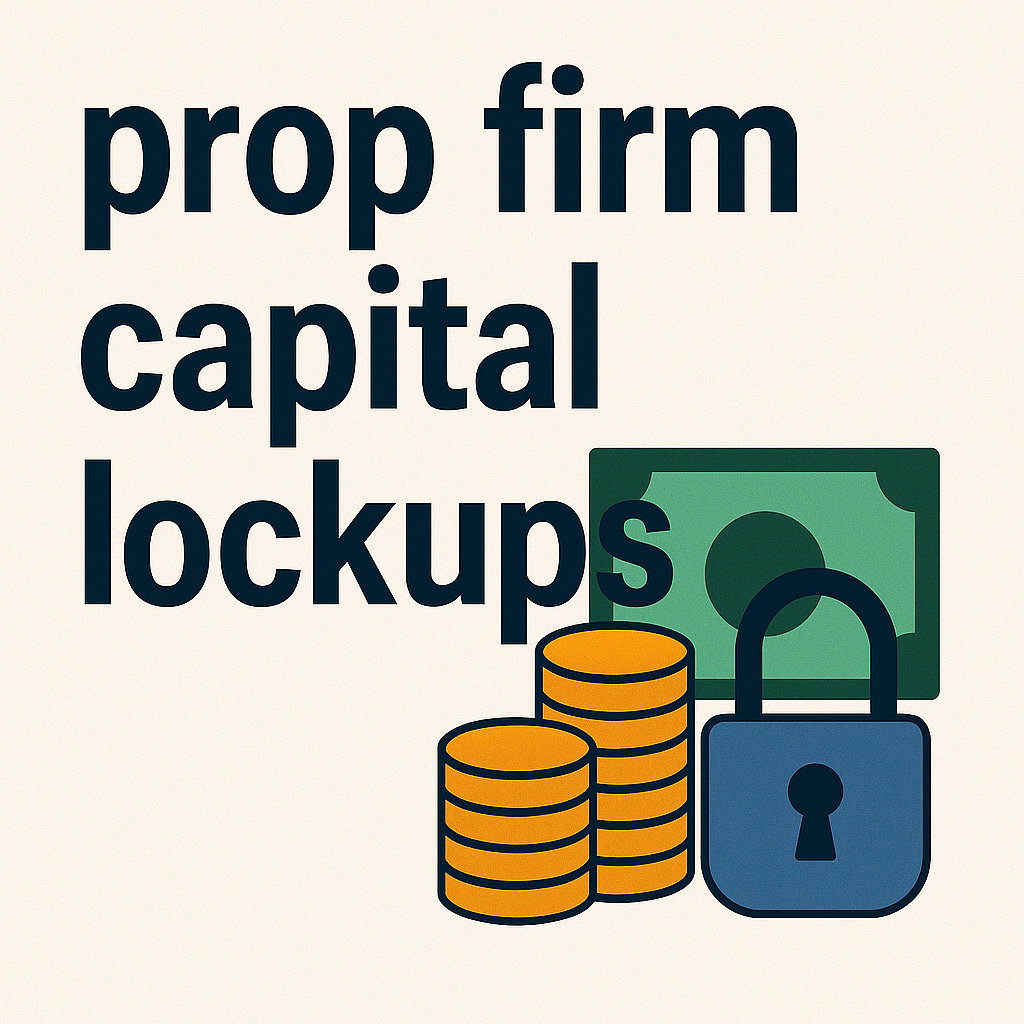Introduction: Understanding Prop Firm Capital Lockups
One of the key concerns traders face when joining a proprietary trading firm is the fear of capital restrictions. The term prop firm capital lockups has gained traction among traders who worry about whether their funds or profits could be withheld due to complex rules, prolonged evaluation phases, or withdrawal conditions. Understanding how and when capital could be inaccessible is essential to protect your efforts and earnings.
In this article, we’ll break down the concept of capital lockups, explore how various policies impact trader access to profits, and show how to identify transparent and trader-friendly models.
What Does “Capital Lockup” Mean in Prop Trading?
In the context of prop trading, a capital lockup refers to scenarios where a trader’s earned profits or funded account access is delayed, restricted, or subjected to unclear conditions. These lockups typically happen due to:
-
Opaque withdrawal policies
-
Mandatory minimum trading periods
-
Unmet profit consistency rules
-
Clauses that reset accounts after minor violations
While traditional hedge funds use lockup periods to limit investor withdrawals, some prop firms adopt similar models under different terms, often buried in fine print.
Why Prop Firm Capital Lockups Occur
Although not all lockups are bad by design, they can become problematic when the firm lacks transparency. Some of the common reasons include:
-
Incentivizing Longevity: Certain firms design models that require traders to stay active over a set duration before withdrawals are allowed.
-
Risk Management: Firms may delay access to profits to confirm consistent and sustainable trading performance.
-
Penalty Enforcement: Lockups are sometimes used as a penalty mechanism for rule violations, even if they are minor.
At Larsa Capital, for example, trader funds remain accessible under clearly defined conditions. There are no hidden lockup periods, and traders can withdraw profits semi-monthly, once the minimum profit threshold is met.
Spotting Hidden Capital Lockup Terms in Agreements
Many traders overlook the importance of reading the firm’s terms and conditions. Before joining any prop firm, make sure to:
-
Read the Withdrawal Policy in Detail: Understand how often you can request payouts and whether there’s a required profit threshold.
-
Check for Time-Based Restrictions: Some firms mandate a minimum time before you’re eligible to withdraw or scale.
-
Review the Rules Around Violations: Ensure minor infractions don’t lead to account resets or loss of eligibility.
-
Analyze the Evaluation Rules: Look for rules that reset your progress or delay verification, effectively locking your capital in a loop.
How to Avoid Prop Firm Capital Lockups
The best way to protect yourself from unexpected prop firm capital lockups is through due diligence. Here’s how:
-
Choose Transparent Firms: Select firms that outline their profit-sharing and withdrawal conditions upfront.
-
Ask Questions Before You Pay: Reach out to support teams for clarification before committing your money.
-
Look for Community Feedback: Reviews from other traders often reveal if a firm enforces sneaky lockups.
-
Use Trial Accounts First: Some firms offer demo versions or low-cost evaluations that let you test the system before going fully live.
These steps help prevent frustration and financial setbacks down the line.
The Role of Evaluation Models in Lockups
Most prop firms use evaluation models to assess trader skill. While this structure is reasonable, the way evaluations are designed can lead to unintended capital hold-ups. For instance:
-
If the firm requires a specific number of trading days per phase, completing a phase too quickly may still result in forced waiting periods.
-
Some evaluations impose a reset clause if you exceed a drawdown by even a few cents, sending you back to step one.
-
Others deny profit withdrawals until multiple months of trading have passed, even after successful evaluation.
A firm like Larsa Capital keeps things fair by offering a two-step challenge with clearly defined rules, achievable targets, and no excessive time locks.
Transparency: The Ultimate Protection
Traders should not only evaluate firms based on low fees or big payouts but also on how accessible profits truly are. True transparency means:
-
You know when and how you can withdraw profits.
-
You understand the conditions that allow or delay verification.
-
You’re not left in the dark about your account’s progress or standing.
Transparent firms allow traders to focus on what really matters—executing solid strategies—without worrying about whether their capital is stuck in limbo.
Final Thoughts: Trade with Clarity, Not Uncertainty
The phrase prop firm capital lockups should never be a hidden risk you discover too late. As the prop trading industry grows, traders must stay informed and vigilant. Always read the fine print, ask for clarification, and prioritize transparency over hype.
With clear policies, timely payouts, and fair evaluations, firms like Larsa Capital set a strong example in protecting trader capital and building trust. Your success should be built on performance—not uncertainty.

